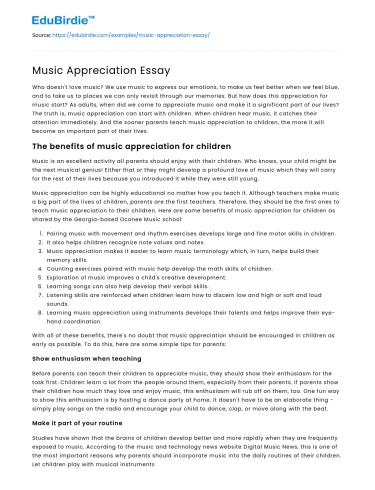Who doesn't love music? We use music to express our emotions, to make us feel better when we feel blue, and to take us to places we can only revisit through our memories. But how does this appreciation for music start? As adults, when did we come to appreciate music and make it a significant part of our lives? The truth is, music appreciation can start with children. When children hear music, it catches their attention immediately. And the sooner parents teach music appreciation to children, the more it will become an important part of their lives.
The benefits of music appreciation for children
Music is an excellent activity all parents should enjoy with their children. Who knows, your child might be the next musical genius! Either that or they might develop a profound love of music which they will carry for the rest of their lives because you introduced it while they were still young.
Save your time!
We can take care of your essay
- Proper editing and formatting
- Free revision, title page, and bibliography
- Flexible prices and money-back guarantee
Music appreciation can be highly educational no matter how you teach it. Although teachers make music a big part of the lives of children, parents are the first teachers. Therefore, they should be the first ones to teach music appreciation to their children. Here are some benefits of music appreciation for children as shared by the Georgia-based Oconee Music school:
- Pairing music with movement and rhythm exercises develops large and fine motor skills in children.
- It also helps children recognize note values and notes.
- Music appreciation makes it easier to learn music terminology which, in turn, helps build their memory skills.
- Counting exercises paired with music help develop the math skills of children.
- Exploration of music improves a child's creative development.
- Learning songs can also help develop their verbal skills.
- Listening skills are reinforced when children learn how to discern low and high or soft and loud sounds.
- Learning music appreciation using instruments develops their talents and helps improve their eye-hand coordination.
With all of these benefits, there's no doubt that music appreciation should be encouraged in children as early as possible. To do this, here are some simple tips for parents:
Show enthusiasm when teaching
Before parents can teach their children to appreciate music, they should show their enthusiasm for the task first. Children learn a lot from the people around them, especially from their parents. If parents show their children how much they love and enjoy music, this enthusiasm will rub off on them, too. One fun way to show this enthusiasm is by hosting a dance party at home. It doesn't have to be an elaborate thing - simply play songs on the radio and encourage your child to dance, clap, or move along with the beat.
Make it part of your routine
Studies have shown that the brains of children develop better and more rapidly when they are frequently exposed to music. According to the music and technology news website Digital Music News, this is one of the most important reasons why parents should incorporate music into the daily routines of their children. Let children play with musical instruments and listen to different types of music as part of their everyday routine. Making music part of their habit ensures that music also becomes a regular part of their lives. From books or toys which play music or even apps which encourage an appreciation of music, there are plenty of ways to do this. The more children are exposed to music, the more they develop an appreciation for it.
Play games to encourage music appreciation
When parents teach music appreciation to their children through games, this makes a huge difference in how easy this task becomes. There are so many different kinds of games parents can play with their children which encourage music. This is especially true for young children who just want to play all the time. As long as your child is excited about the musical activity you want him to do, he will be engaged with it all the way to the end. Go online and search for games that encourage music appreciation and you're sure to find a wealth of information you can use to promote a lifelong love of music in your little one.
Teach pitch and rhythm
One thing to remember when it comes to teaching music appreciation is that you don't always have to use instruments. There are other ways to teach pitch, rhythm, and other musical concepts to children. For instance, you can teach your child to sing low and high notes in order to demonstrate pitch. You can even draw sound waves to illustrate this concept to your child as you ask him to sing using different pitches. When it comes to teaching rhythm, there are several ways to do this too. Clapping, stomping, snapping, tapping, and more can help you demonstrate rhythm to your child. You can also play a lot of songs for your children in order to show them what rhythm sounds like when it's used in music.






 Stuck on your essay?
Stuck on your essay?

